By Joice Alves
LONDON (Reuters) - Global gender parity is going to take more than five generations to achieve, as women still lag far behind men in the economy and politics and surging inflation last year disproportionately hurt their financial health, findings by the World Economic Forum (WEF) and equality experts show.
Several investors and regulators are pushing for corporate diversity, but data from the WEF shows it will still take 132 years to reach global gender equality in general versus a projected 136 years in 2021.
The analyses of the data in the WEF's Global Gender Gap report takes into consideration gender disparity in economic opportunities, education, political empowerment, health and safety.
Women also lost around $800 billion in income globally due to the COVID-19 pandemic, BofA Global Research said in a separate report, as almost half of those employed work in informal sectors, which saw sharp pay cuts since COVID. Many also increased the time spent on childcare during lockdowns.
Social unrest in Iran and the war in Ukraine - which exacerbated inflation as commodity prices soared - kept many girls and women out of school and work, it added.
The income and family responsibility disparities, coupled with a higher cost of living for women than men, mean women are at an even greater risk of real wage losses, said Dimple Gosai, head of U.S. environmental, social and governance (ESG) at BofA.
"We now fear post-pandemic inflation is threatening to wipe out the progress women have achieved," she said.
Rising childcare costs outpacing income growth "is a significant barrier preventing women from getting into, remaining and progressing in the labour force", Gosai said.
Women are also facing disproportionately higher costs for some products than men. In the United States, personal care products are 13% more expensive for women while in Britain, prices for formal shoes have increased 75% versus those for men, BofA data showed.
North America, Europe closer to gender parity https://www.reuters.com/graphics/WOMENS-DAY/COMPANIES-DIVERSITY/zjpqjygxavx/chart.png
Globally, women's participation in formal labour has made little progress over the last three decades, JP Morgan said, accounting for just under 47% of the labour force compared to 72% for men while they still perform on average 76% of all unpaid care work.
Women in developing countries are the most vulnerable. But there are still large pay differences everywhere, even in the world's richest economy, as women and minorities have lower representation in "high-paying" U.S. industries and jobs that are less affected by inflation pressures, such as technology or finance, BofA said.
An index on women's financial health compiled by investment services firm Ellevest shows that women in the United States are in their worst financial shape since 2018.
CORPORATE BABY STEPS
Top investors like Schroeder and Amundi have pledged to include investment picks based on how companies rank in terms of gender diversity, which could prove beneficial in the long run.
The BofA data shows that U.S. companies with greater gender diversity have offered a median 20% higher return on equity since 2005 than those who lack it.
A push from lawmakers has also encouraged companies to hire more women and name more to their boards.
In Europe, where European Union and UK regulators have set a 40% board quota for women, almost 80% of large companies had at least one-third of their board seats held by women, BofA showed.
"If a company is not meeting its obligations, we would certainly engage with that business very directly on it because that (diversity) is an important part of ensuring good governance in all markets," said Peter Harrison, chief executive officer at asset manager Schroders (LON:SDR), which has more than $75 billion under management.
Europe's largest asset manager Amundi, which has 1.93 trillion euros ($2.1 trillion) under management, said in an emailed response that it monitors the pay gap between men and women in equivalent positions. It has engaged with hundreds of companies on the protection of employees and on human rights, it said.
According to consultancy firm EY, almost half of European financial services investors state that gender diversity in the boardroom significantly influences their decision to invest in a company.
However, more women on boards doesn't mean more women in executive roles.
Globally, gender inequality in boardrooms will not be eliminated until 2038, data modelled by provider MSCI showed. For senior executive roles, gender parity still looks out of reach.
UK regulators said women's share of board seats at Britain's 350 biggest-listed companies reached 40% for the first time in 2022, three years ahead of plan. According to EY, only 17% of FTSE 100 women board directors hold senior executive roles.
Studies show that there are "significant correlations" between the presence of women on corporate boards and strong financial performance, MSCI and BofA said.
U.S. companies focused on gender diversity on boards and senior executive level have achieved 43% lower earnings risk in subsequent three years than those who lack such diversity, BofA said, citing its own analysis.

Still 60 years to close the gender gap in North America, Europe Still 60 years to close the gender gap in North America, Europe https://www.reuters.com/graphics/WOMENS-DAY/COMPANIES-DIVERSITY/zdpxdxwlepx/chart.png
($1 = 0.9386 euros)